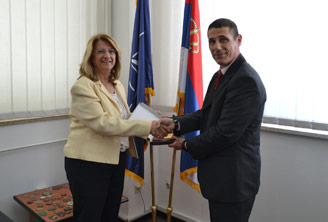NATO and Serbia foster security-related scientific cooperation
Over the last years, Serbia has become increasingly active within the framework of the NATO Science for Peace and Security (SPS) Programme and identified many areas for practical cooperation with NATO. An Information Day in Belgrade, Serbia on 30 June 2016 provided the opportunity to take stock of the successful SPS cooperation, to explore new areas of cooperation and to raise awareness about the Programme.

“Participation in NATO SPS projects will undoubtedly improve the quality of security-related scientific work and provide valuable insights for the Serbian Armed Forces,” said Mr Nenad Nerić, State Secretary in the Ministry of Defence of Serbia.
One such successful multi-year project is a collaboration between Serbia and Germany where scientists and experts are working on ‘T-Whex: A Robust Robot with Physically Tunable Whegs’. Initiated in 2014, this project aims to extend the ability of robots to operate in security-relevant scenarios, including building reconnaissance, explosive ordnance disposal and demining, and CBRN detection and mitigation. The development of a class of robots with ‘whegs’ (a combination of wheels and legs) will enhance manoeuvrability in rough terrain, thereby increasing the number of operations in which robots could be deployed.
Hosted by the NATO Military Liaison Office (MLO) in Serbia and the Serbian Ministry of Defence, the Information Day underscored the interest and importance of joint cooperation between NATO and Serbia on joint activities such as this. Serbian government representatives and experts presented their priority areas of cooperation and used the opportunity to exchange ideas for potential new SPS activities. The event attracted around 50 participants from military academies, the scientific sector and government. High-level participants included Brigadier General Cesare Marinelli, Chief of the MLO as well as Colonel Katarina Štrbac, Director of the Directorate for European Integration and Project Management in the Ministry of Defence of Serbia. Both expressed a desire to deepen practical cooperation in developing new SPS initiatives with Serbia.
“Serbia is a valuable partner nation for NATO. We share many interests and we face many common security challenges, which is why we should use the opportunity to work more closely together. The Science for Peace and Security is a valuable partnership programme in this regard and can facilitate dialogue and practical cooperation with concrete results,” explained Dr Deniz Beten, Senior SPS and Partnership Cooperation Advisor.
The Information Day was also attended by the NATO Chief Scientist, Major General Albert Husniaux from the Science and Technology Organization (STO), which alongside the SPS Programme, is interested in collaborating with Serbia.

Brigadier General Marinelli welcomes Dr Beten to the MLO
Building upon the successful Information Day in Serbia in July 2015, a follow-up visit was also made to the Ministry of Science and Education of Serbia. During the visit, ideas for new top-down flagship projects with high visibility were identified and future projects in the domains of defence against chemical, biological, radiological and nuclear (CBRN) threats, counter-terrorism as well as cyber defence were discussed.
SPS cooperation with Serbia
NATO and Serbia have steadily built up cooperation and dialogue since 2006. Over the last years, Serbia has become increasingly active in the framework of the SPS Programme. Leading areas of cooperation include energy and environmental security, counter-terrorism, Women, Peace and Security as well as defence against CBRN agents.
Most recently, between 5 and 7 July 2016, an Advanced Research Workshop (ARW) was organised, addressing the implications of climate change and disasters on military activities in the Balkan region. Led by the Crisis Management and Disaster Response Centre of Excellence in Bulgaria and the Serbian Ministry of Defence, this workshop identified policies to build resiliency to potential disaster situations.
